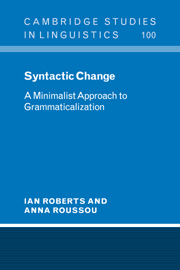Introduction
Published online by Cambridge University Press: 22 September 2009
Summary
This book has two related goals. On the one hand, we wish to address the question of syntactic change in the context of the minimalist programme, by using (variants of) some of the technical devices that have been proposed in order to provide a general analysis of a pervasive diachronic phenomenon, grammaticalization. On the other hand, we wish to address a deeper question raised by the nature of the minimalist programme itself. A central idea behind the minimalist programme is the idea that language is in some sense a perfect system (the strong minimalist thesis: see Chomsky (1995:1–10), (2000:96f.), (2001:1–2)). Now, perfect systems do not vary over time, so the very existence of syntactic change appears to be a challenge to this thesis. The existence of synchronic variation among grammatical systems also poses an apparent problem for the strong minimalist thesis. The account of grammaticalization that we develop will lead to what we believe to be an interesting response to this problem, and an explanation for the existence of apparent variation and change in syntactic systems which we believe to be consistent with the strong minimalist thesis.
The term grammaticalization was first introduced by Meillet (1912) to describe the development of new grammatical (functional) material out of ‘autonomous’ words. Since then the topic has received much attention in the literature on language change, especially amongst typologists (see the references and citations in Janda (2001), and the impressive compendium of examples of the phenomenon in Heine & Kuteva (2002)).
- Type
- Chapter
- Information
- Syntactic ChangeA Minimalist Approach to Grammaticalization, pp. 1 - 8Publisher: Cambridge University PressPrint publication year: 2003



